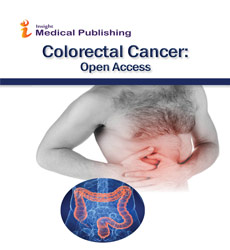Multicenter Randomized Controlled Clinical Trial Comparing Conventional and Lateral Invagination Techniques
Department of Medical Science, University of Delhi, New Delhi, India
- Corresponding Author:
- Carol Gonz
Department of Medical Science
University of Delhi, New Delhi, India
E-mail: carolgonz@mail.com
Received date: August 24, 2022, Manuscript No. IPJCC-22-14431; Editor assigned date: August 29, 2022, PreQC No. IPJCC-22-14431 (PQ); Reviewed date: September 13, 2022, QC No. IPJCC-22-14431; Revised date: December 23, 2022, Manuscript No. IPJCC-22-14431 (R); Published date: January 02, 2023, DOI: 10.36648/2471-9943.9.1.002
Citation: Gonz C (2023) Multicenter Randomized Controlled Clinical Trial Comparing Conventional and Lateral Invagination Techniques. Colorec Cancer Vol:9 No:1
Editorial
Colorectal surgery is performed for many diseases such as colorectal cancer, ulcerative colitis, Crohn’s disease, mechanical bowel obstruction and recurrent diverticulitis, often resulting in major reconstruction of the gastrointestinal tract. Injury, ischemia, rectal prolapse and proctological disorders may also require large or small bowel resection. Potential risks of colorectal surgery are mainly those of any major abdominal surgery, and usually occur while the patient is still in the hospital. Because of the many indications for and the various extents of colorectal or small bowel resections the rate and spectrum of complications differ.
A literature search was carried out, using MEDLINE, PubMed and the cochrane library from 1980 to 2009 using the following terms: complications, risk factors, colorectal surgery, colorectal resection, laparoscopy, surgical site infection, anastomotic leakage, and bowel cleansing. This review is a general overview that provides an update on these topics for the reader.
Risk factors in emergency, in elective open and laparoscopic colorectal surgery should be recognized prior to surgery in order to reduce complications and to initialize individualized treatment as soon as possible. However, some risk factors such as age, gender and prior abdominal surgery can obviously not be influenced before surgery.
In general, complications can be divided into intraoperative and postoperative complications. Occurrence of intraoperative complications such as bleeding, bowel injury, ureteral lesions and bladder injuries are caused by intraabdominal adhesions, anatomic problems, the experience of the surgeon and many other factors. Major postoperative complications include wound infection, anastomotic leakage, ileus and bleeding. Only a few recent publications elucidate risk factors for intra and postoperative complications in colorectal surgery. The importance of some risk factors such as age, nutrition status of the patient and experience of the surgeon are becoming more accepted. In addition, there are many other factors that influence outcome of colorectal surgery which could be modified preoperatively.
All medical data will be collected by the main coordinating center. Data collection will be facilitated through online case registration forms for the perioperative period. For patient privacy, hospital patient identification numbers will not be disclosed to the coordinating center. All patient data is coded and identified by a randomization number. This randomization number does not include the patient's initials or date of birth. The local investigator will have a decoding list with randomization numbers and hospital patient identification numbers of their patients on file at the investigator site. At each trial operation, the participating surgeon or surgeons are noted on the case record form. All patients considered for surgical resection of the left colon, sigmoid or upper rectum electively should be registered, including those who declined randomization and those who did not meet the inclusion criteria. Brief details of the reasons why patients are not randomized or excluded should be given.
Anastomotic leakage is an important complication related to colorectal surgery that entails an increase in morbidity, mortality and costs over the standard procedure, as well as a greater impact on quality of life. This study aims to establish whether the double staple colorectal anastomosis lateral invagination technique, which is relatively simple and quick to perform, is associated with lower rates of anastomotic dehiscence. The study is designed in such a way that at no time is a variation in the routine management of the patient. The screening and treatment of complications will be carried out as is done in current clinical practice.
Open Access Journals
- Aquaculture & Veterinary Science
- Chemistry & Chemical Sciences
- Clinical Sciences
- Engineering
- General Science
- Genetics & Molecular Biology
- Health Care & Nursing
- Immunology & Microbiology
- Materials Science
- Mathematics & Physics
- Medical Sciences
- Neurology & Psychiatry
- Oncology & Cancer Science
- Pharmaceutical Sciences
